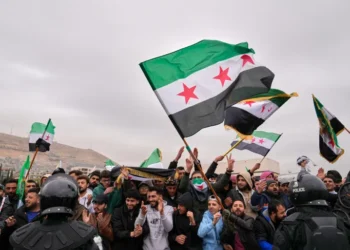The United States’ unwavering support for Israel has become a subject of heated debate and scrutiny.
This dynamic was recently underscored by the passage of a significant foreign aid package in the United States House of Representatives.
This move pits the imperative of bolstering a key ally against concerns over the consequences of unchecked support.
U.S Congresswoman, Delia Ramirez said that “history books will write about” how US leaders “lacked the courage and moral clarity to stand up to” Israeli Prime Minister, Benjamin Netanyahu.
The congresswoman made the comments in a post on X, in response to reports that 22 people were killed in Rafah on Sunday, April 21, 2024, night.
Ramirez, who represents a district in the state of Illinois, pointed out that Netanyahu had bombed the “safe zone” of Rafah just one day after the US House voted to give aid to Israel “in unconditional military funding to Netanyahu’s campaign of death and destruction.”
The United States House of Representatives has passed a $95bn legislative package providing assistance to Ukraine, Israel and Taiwan.
The long-awaited bill, which passed on Saturday, saw broad bipartisan support and could be signed into law as early as next week after it passes through the Senate and lands on President Joe Biden’s desk for his signature.
The foreign aid package allocates about $26.38bn for Israel.
The bill, which was stalled for a long time following deep splits in Republican camps, now heads to the Senate for a vote.
Edward Ahmed Mitchell, from the Council on American-Islamic Relations, said the vote is a missed opportunity to rein in the Israeli onslaught on Gaza.
“This has taken away any leverage President Biden might have to Netanyahu to pull back on invading Rafah or killing more innocent people,” he said.
Hamas condemned the approval of new military aid to Israel.
“This support, which violates international law, is a licence and a green light for the Zionist extremist government to continue the brutal aggression against our people,” Hamas said in a statement.
However, despite allocating funds for humanitarian assistance, the bill stipulates that funding for the UN agency for Palestinian refugees (UNRWA) is prohibited.
This follows Israeli unsubstantiated accusations that the agency’s staff were involved in Hamas’s October 7 attacks.
Israeli Prime Minister Benjamin Netanyahu welcomed the billions of dollars in US assistance, writing on X that it “demonstrates strong bipartisan support for Israel and defends Western civilization”.
However, the Palestinian presidency condemned the bill as “an aggression against the Palestinian people” and a “dangerous escalation.”
Nabil Abu Rudeina, Spokesman for Palestinian President Mahmoud Abbas, stated that the money would “translate into thousands of Palestinian casualties in the Gaza Strip” and the occupied West Bank.
Philippe Lazzarini, the head of the UN agency for Palestinian refugees (UNRWA), said Israeli settler violence is contributing to a “state of constant fear” in the occupied West Bank.
He said in an X post that the situation in the West Bank is worsening by the day including in Palestine refugee camps, many of which are operated by UNRWA.
He added, “It is time to end the occupation and address the longest lasting unresolved conflict through political means and a genuine commitment to peace.”
Lazzarini’s comments came after the Palestinian Health Ministry said 14 people were killed in an Israeli raid on the Nur Shams refugee camp in the occupied West Bank’s Tulkarem on the weekend.
Rafah Operation Inevitable And Imminent
Mohamad Elmasry, a professor in the Media Studies programme at Doha Institute for Graduate Studies, opined that he expects the Israeli military to launch its long-feared assault on Rafah soon, despite the humanitarian consequences for civilians.
“It seems like it’s imminent … Israel has been warning for many weeks now that it’s going to invade Rafah, and then a few weeks ago it said that it had identified a specific date for its invasion,” Elmasry said.
He added, “More recently, there have been reports to suggest that the United States may have signed off on the invasion of Rafah in exchange for Israel not escalating with Iran.”
With Israel still unable to achieve its war goals, including freeing the remaining captives held in Gaza and defeating Hamas militarily, Elmasry posited a few possible reasons for such an operation.
“From one perspective [Israel] can try to salvage something out of [its war on Gaza] militarily. Maybe that’s rescuing hostages, maybe that’s killing Hamas leaders and other possible things they could point to as evidence of victory.
“Another way to look at it more cynically … Israel’s ultimate end game is to try to make life unlivable for Gazans so that Israel can implement its greater Israel plan. That means transferring the population outside of Gaza.”
Mohamad Elmasry
READ ALSO: Ghanaian Gospel Musician KODA Passes On























